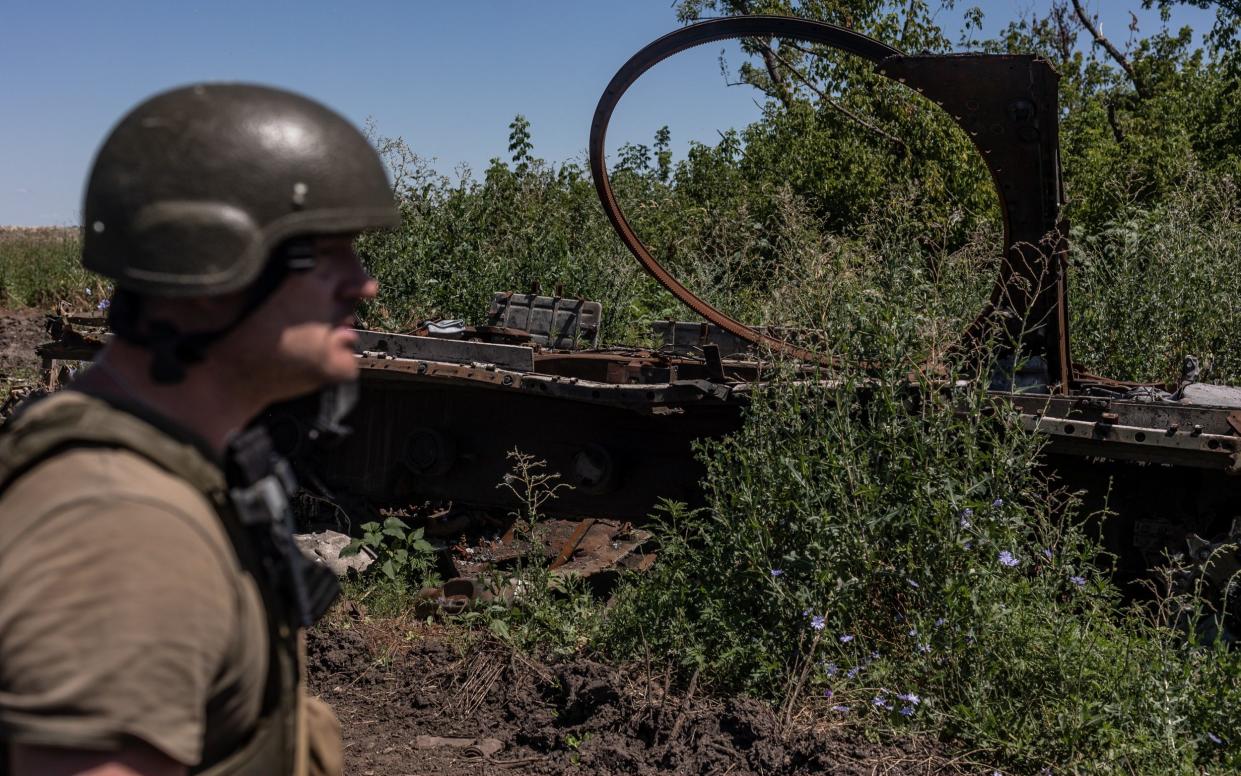Ukraine: The Latest - the Russian army 'may be splintering at the top'

- Oops!Something went wrong.Please try again later.
Today on Ukraine: The Latest, we bring you latest updates from the warzone, analyse the sacking of Major General Ivan Popov, and discuss morale and casualty rates among Russian forces during the Ukrainian counter-offensive.
First, Assistant Comment Editor Francis Dearnley sums up the latest update from the British MOD:
According to the British Ministry of Defence, Russia may be worried for the safety of its nuclear submarines after the mutiny by Wagner mercenaries last month.
They understand that submarines from Moscow’s Northern Fleet will not take part in this month’s Navy Day Fleet Review in St. Petersburg for the first time in its six year history. Now, the MOD say this could reflect the need to keep submarines on standby for operations, but adds that it could be because of security.
And this, of course, comes after reports that the Wagner paramilitary group came close to seizing a stockpile of nuclear weapons as they marched towards Moscow in June. So the MOD say, and I quote, there is a “realistic possibility that internal security concerns since Wagner attempted its mutiny have contributed to this decision.”
Senior Foreign Correspondent Roland Oliphant also gives his take on the sacking of Russian Major General Ivan Popov, who publicly voiced his criticisms of the Russian military elite:
I think there are serious cracks showing in the Russian War machine at the very top. We’ve talked at length about the Wagner mutiny, which was one expression of that, but this is the first time that I can think of where you have a senior officer, not Prigozhin or some Z-blogger who whose job is to mouth off, but an actual senior general commissioned officer, airing exactly those complaints that we’ve heard for so long.
The central nub of his complaint, the way he tells it, was that ‘we don’t have enough counter battery fire’, ‘we don’t have enough artillery reconnaissance’, and because of that, a lot of people are dying. And he says it came to the point where he had to either, shut up, be a ‘coward’, or give them the uncomfortable bad news.
If that’s true, it suggests a military that’s really got a problem with hearing basic facts. Because this problem with artillery is a basic fact about this war. You will find soldiers on both sides who are grumbling about this and grumbling about how their superiors handle it.
And what should be happening, in both armies, is that, senior officers should be going to their superiors and banging the table and saying, look, my guys need more ammo, fighting the corner for your unit.
Later, former tank commander Hamish de Bretton-Gordon speaks about how the impact of the huge casualties the Russian army may be starting to filter down to the Russian people:
In various discussions I’ve had with intelligence people in this country and overseas, there is evidence this actually starting to get through to the Russian population. Most Russian media controlled by the Kremlin is all propaganda and disinformation, but suddenly people are beginning to realise the human cost of what we’re looking at here. There is a view, I think in certain security organisations, that this dam might well be about to burst.
We might be reaching some sort of tipping point.
Listen to Ukraine: the Latest, The Telegraph’s daily podcast, using the audio player at the top of this article or on Apple Podcasts, Spotify, or your favourite podcast app.
War in Ukraine is reshaping our world. Every weekday the Telegraph’s top journalists analyse the invasion from all angles - military, humanitarian, political, economic, historical - and tell you what you need to know to stay updated.
With over 30 million downloads, our Ukraine: The Latest podcast is your go-to source for all the latest analysis, live reaction and correspondents reporting on the ground. We have been broadcasting ever since the full-scale invasion began.
Ukraine: The Latest’s regular contributors are:
David Knowles
David is Head of Social Media at the Telegraph where he has worked for almost two years. Previously he worked for the World Economic Forum in Geneva. He speaks French.
Dominic Nicholls
Dom is Associate Editor (Defence) at the Telegraph having joined in 2018. He previously served for 23 years in the British Army, in tank and helicopter units. He had operational deployments in Iraq, Afghanistan and Northern Ireland.
Francis Dearnley
Francis is Assistant Comment Editor at the Telegraph. Prior to working as a journalist, he was Chief of Staff to the Chair of the Prime Minister’s Policy Board at the Houses of Parliament in London. He studied History at Cambridge University and on the podcast explores how the past shines a light on the latest diplomatic, political, and strategic developments.
They are also regularly joined by the Telegraph’s foreign correspondents around the world, including Joe Barnes (Brussels), Sophia Yan (China), Nataliya Vasilyeva (Russia), Roland Oliphant (Senior Reporter) and Colin Freeman (Reporter). In London, Venetia Rainey (Weekend Foreign Editor), Katie O’Neill (Assistant Foreign Editor), and Verity Bowman (News Reporter) also frequently appear to offer updates.

